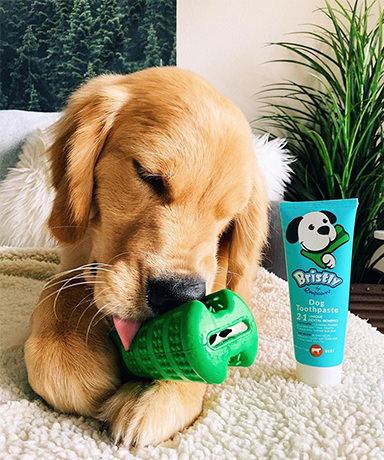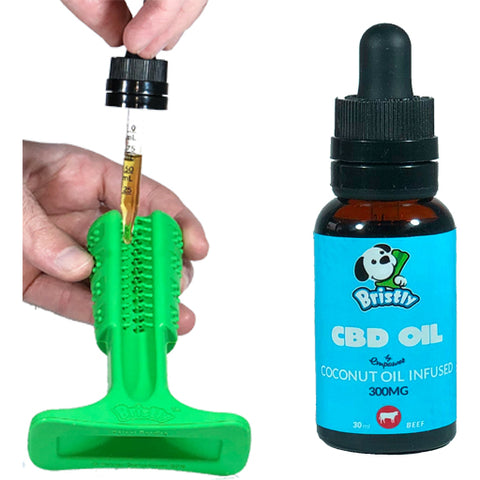Your Cart is Empty

Time to make your inbox pawsome
Sign up today and get 10% OFF your first purchase!



Because cannabis is becoming legal in many states, medical marijuana is becoming a popular option for people experiencing certain diseases or chronic conditions and haven't been able to find relief otherwise. As more research is developing, many more pet parents are using cannabidiol, or CBD, to improve their dog's health and wellness, too.
“CBD Contains Less than .03% THC”
There are actually over 113 cannabinoids found in cannabis, or marijuana, plant. These cannabinoids have different properties - you probably know of THC, which is the psychoactive element that gives users a "high". The CBD cannabinoid is derived from hemp, a strain of the same plant as marijuana (cannabis sativa), and has a medicinal property that is non-psychoactive because it contains very little THC - less than .03 percent, in fact. This means that it is safe to use on humans and pets and won't lead to any adverse hallucinatory or psychotropic effects. It has no known toxicity level, and it can't cause an overdose.
CBD oil affects the body by utilizing the endocannabinoid system. All mammals have this biological system, which functions through 3 pain parts: endocannabinoids, endocannabinoid receptors, and enzymes.
Endocannabinoids are the minuscule vessels that assist in generating a plethora of reactions throughout the body, like prenatal development and memory, to name a few. There are two main endocannabinoids that work in mammals - anandamide and arachidonoylglycerol (or 2-AG) - and they work within the central nervous system. You can compare endocannabinoids to neurotransmitters in the body because they can influence what neurons do and how certain cells work together.
Endocannabinoid receptors are the receiving ends of endocannabinoids. They secure endocannabinoids like 2-AG and anandamide to ensure certain processes are happening within the body. CB1 is the most common cannabinoid receptor which can exist at high concentrations in multiple parts of the brain. CB2 is another cannabinoid receptor, but it is much less common and is usually only seen on certain types of neurons and immune cells.
With over 1000 enzymes performing any number of cellular reactions in the human body, it's no wonder that an enzyme also exists to catalyze cannabinoids. Hydrolase and monoacylglycerol lipase are just a couple of the enzymes that synthesize cannabinoids.
So, as we've just learned, the endocannabinoid system is a biological system like the endocrine or nervous system, and the cannabinoids found in the body occur naturally and work with certain enzymes and receptors to assist in certain biological functions like fertility, memory, and appetite. Much like how serotonin and dopamine levels in the brain can be affected by synthetic drugs to influence illnesses such as anxiety and depression, the endocannabinoid system can also be affected by external elements such as cannabidiol. The difference in this example is that CBD occurs naturally and is not produced in a lab, making the potential side effects to the body reduce drastically.

The internally generated cannabinoid receptors help to maintain the natural balance in your dog's body and, as stated above, can be stimulated by CBD. Since there is such a low amount of THC found in CBD, it will not have a psychoactive effect on your pet. It will just move through your pup's endocannabinoid system and help to regulate some of the bodily processes on a cellular level. CBD activates multiple distinct molecular pathways, some of which trigger the endocannabinoid system collaterally. Once CBD enters the body, it latches onto fatty acid binding proteins, or FABs, which takes the cannabinoid to the cell. After entering the cell, CBD helps to regulate receptors on the nucleus of certain cells.
A study conducted by the College of Veterinary Medicine and Biomedical Sciences of Colorado State University found that" Dog owners reported that the hemp products were moderately or very helpful in numerous areas.
CBD has been found to help relieve inflammation in dogs by interacting with receptors in the brain, central nervous system, and organs.
CBD has been proven to be an effective anti-inflammatory that provides pain relief. As pain is caused by an inflammatory response, CBD oil can reduce inflammation by elevating a certain chemical in the body that mediates the immune system. By interacting with receptors in the brain and immune system, CBD can reduce inflammation and alleviate pain.
Cannabinoids in cannabis, including cannabidiol, have antibacterial properties. CBD can help inhibit bacterial growth and help the body combat the effects of bacteria to prevent illness.
CBD has demonstrated antifungal properties giving it the ability to fight fungal infections, like candidiasis that can cause health issues. Studies show that CBD may help kill the fungus. CBD has proven that it can stop cells from multiplying without inhibiting cell growth within the body.
By interacting with the body's naturally occurring endocannabinoid system, CBD can naturally soothe and calm anxiety. As the body naturally releases endocannabinoid chemicals, or you supplement them, they connect with the receptors which stimulate the body's natural ability to create the mood stabilizing neurotransmitter serotonin.

While the best way to maintain your dog's oral health is to brush their teeth daily, CBD acts as a great supplement to the oral care routine to prevent gum disease.
Also known as periodontal disease, gum disease affects about 3/4 of dogs and can lead to an early death. Possible symptoms of periodontal disease are a pain in the mouth, refusal to eat, bad breath, and more.
Dogs may have oral pain for several reasons: cuts from bones and toys, tooth pain, and periodontal disease. Because CBD is anti-inflammatory, it can offer oral pain relief no matter the cause. Using the oil topically and internally may provide additional benefits and promote the body's natural inflammatory response to support the immune system.
The mouth is a breeding ground for bacteria, which can result in poor oral health and eventually gum disease. CBD oil is both antibacterial and antifungal to battle bacteria and keep the mouth healthy. Just like your mouth, your dog's mouth consists of both good and bad bacteria, and it's vital to keep an equilibrium between the two. If the bad bacteria begin to take over, that's when periodontal disease can start to develop. CBD can also fight plaque and tartar to improve overall oral health. By using CBD, you can prevent the spread of bacteria and inhibit its growth to promote a healthy mouth and fresher breath.
Candida is a sugar-digesting yeast that forms part of the normal flora in your dog's mouth, nose, ears, and gastrointestinal and genital tracts. It's a type of fungal infection that can affect your dog no matter age or breed. As CBD is antifungal, it can inhibit the growth of candida in your dog's body by preventing the cells from multiplying. Because stress and weakened immune response could be a cause of candidiasis, CBD can be used to reduce stress levels and improve immune response to help prevent future candidiasis.
There are a few different methods for administering CBD to your dog.
This is one of the most popular methods for giving your dog CBD. Most bottles come with a dropper that allows you to easily measure how much CBD you give your dog. With drops, you can easily use CBD for topical and external applications.
One of the easiest ways to get CBD into your dog's system is to give them treats and chews infused with CBD. While there are many treats on the market, it's important to find out how much CBD is in a serving so that you can make sure you're giving your pup the right amount.
Tablets are another easy method to introduce CBD to your dog. Some dogs might not like tablets and could confuse them with other types of pills they've taken before and had a negative experience with. You can make the process simpler by folding the tablet in a piece of cheese or lunch meat.
While internal applications of CBD have been proven effective, you can also use CBD oil externally. All you need is your tincture of CBD, and you can rub some on the skin and fur of your pup. This will help with arthritis pain, skin infections, and can even help moisturize skin and coat.

Bristly CBD oil infused with coconut oil was crafted using the highest quality natural ingredients. Bristly's new CBD Oil helps relieve oral pain associated with periodontal disease and promote a healthy mouth. Anti-fungal and antibacterial properties of CBD plus antimicrobial properties of Coconut oil battle bacteria and fight plaque buildup. Great for senior dogs who already have signs of periodontal disease and dogs of all ages as a means of supplementing dog's oral health routine to help prevent gum disease before it begins. Bristly CBD Oil is not meant to replace daily brushing but act as an extra soldier to protect dogs' mouths from harmful bacteria.
Produced by CO2 or ethanol extraction, full spectrum CBD oil includes the "impurities" that are found in the cannabis plant. These impurities help create an effective CBD crude oil that contains beneficial chemical compounds for maintaining health and wellness.
Our CBD uses two different methods of extraction to obtain the highest quality full spectrum CBD.
CO2 is nontoxic, and the extraction processes do not contribute toward carbon emissions
CO2 extraction ensures that no flammable petroleum-based solvents like butane are in contact with the CBD oil.
Ethanol extraction can eliminate the need for winterization
Can create superior full spectrum hemp products
Quality is important to us because your dog's health is our number one priority. Our CBD products are 3rd party lab testing to guarantee that each product contains less than the legal limit of THC. Because THC can be harmful to dogs, we make sure not to exceed the safe limit for your pup.
Coconut oil has many health benefits on its own, but when paired with CBD, the two nutrient-rich oils work together to provide oral health benefits to your pup.
The antibacterial and antimicrobial properties of coconut oil help inhibit the growth of bacteria and prevent plaque and tartar buildup.
We recommend using ½ a pipette for up to 25 lb dogs twice a day and full pipette for larger dogs twice a day.
